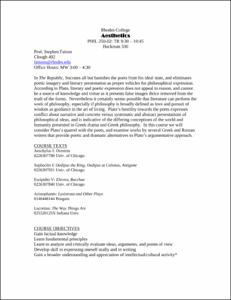Please use this identifier to cite or link to this item:
http://hdl.handle.net/10267/3520Full metadata record
| DC Field | Value | Language |
|---|---|---|
| dc.contributor.author | Faison, Stephen Eliot | - |
| dc.date.accessioned | 2009-02-27T17:36:41Z | - |
| dc.date.available | 2009-02-27T17:36:41Z | - |
| dc.date.issued | 2007-01-11 | - |
| dc.identifier.uri | http://hdl.handle.net/10267/3520 | - |
| dc.description | This syllabus was submitted to the Rhodes College Office of Academic Affairs by the course instructor. | en_US |
| dc.description.abstract | In The Republic, Socrates all but banishes the poets from his ideal state, and eliminates poetic imagery and literary presentation as proper vehicles for philosophical expression. According to Plato, literary and poetic expression does not appeal to reason, and cannot be a source of knowledge and virtue as it presents false images thrice removed from the truth of the forms. Nevertheless it certainly seems possible that literature can perform the work of philosophy, especially if philosophy is broadly defined as love and pursuit of wisdom as guidance in the art of living. Plato’s hostility towards the poets expresses conflict about narrative and concrete versus systematic and abstract presentations of philosophical ideas, and is indicative of the differing conceptions of the world and humanity presented in Greek drama and Greek philosophy. In this course we will consider Plato’s quarrel with the poets, and examine works by several Greek and Roman writers that provide poetic and dramatic alternatives to Plato’s argumentative approach. | en_US |
| dc.language | English(United States) | - |
| dc.language.iso | en_US | en_US |
| dc.publisher | Memphis, Tenn. : Rhodes College | en_US |
| dc.relation.ispartofseries | Syllabi CRN | en_US |
| dc.relation.ispartofseries | 27299 | en_US |
| dc.rights | Rhodes College owns the rights to the archival digital images in this repository. Images are made available for educational use only and may not be used for any non-educational or commercial purpose. Approved educational uses include private research and scholarship, teaching, and student projects. For additional information please contact archives@rhodes.edu. Fees may apply. | - |
| dc.subject | Philosophy, Department of | en_US |
| dc.subject | Syllabus | en_US |
| dc.subject | Curriculum | en_US |
| dc.subject | Academic departments | en_US |
| dc.subject | Text | en_US |
| dc.subject | 2007 Spring | en_US |
| dc.title | PHIL 250-02, Aesthetics, Spring 2007 | en_US |
| dc.type | Syllabus | en_US |
| Appears in Collections: | Course Syllabi | |
Files in This Item:
| File | Description | Size | Format | |
|---|---|---|---|---|
| 2007_sp_PHIL_250-02_27299.pdf | 28.62 kB | Adobe PDF |  View/Open |
Items in DSpace are protected by copyright, with all rights reserved, unless otherwise indicated.